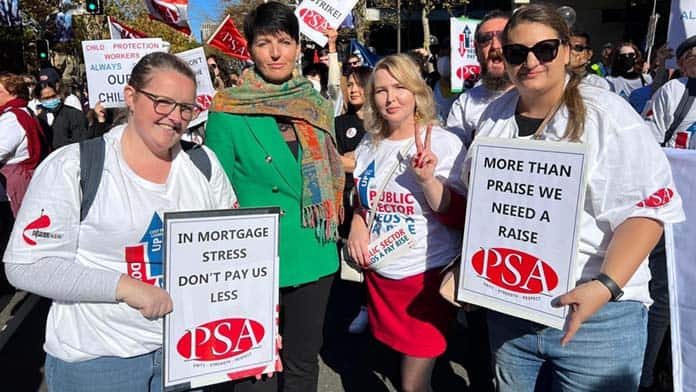The Albanese government is inviting unions, employers and community groups to Canberra for a Jobs and Skills Summit in early September to discuss “our shared economic challenges”.
The summit is modelled on the Hawke Labor government’s 1983 National Economic Summit and Albanese wants to “rediscover the spirit of consensus that Bob Hawke used”.
But Hawke-style consensus politics is a trap the unions need to avoid. In the 1980 and 1990s it devastated them. While profits soared to record levels, workers’ share of national wealth dropped as did union membership and the unions’ fighting capacity.
Stagnant wages will be a big issue at the 2022 summit. Currently wages growth has stalled at 2.6 per cent a year, but inflation is expected to reach 7.75 per cent by year’s end, which will mean a sharp wage cut.
These low wage outcomes are in spite of the July unemployment rate being 3.4 per cent, the lowest in 48 years. When unemployment is low, traditionally unions have been able to push wages up, but two factors are working together against this.
One is the enormous legal restrictions on unions such as bans on industry-wide pattern agreements, multi-employer agreements, solidarity strikes and content in agreements, such as limits on the use of labour-hire.
Severe restrictions are also placed on strikes. Unions can only strike during bargaining periods and only after undergoing a long, complex process. Even once approved, employers can (and successfully do) apply to get strikes suspended on the grounds of their potential impact, destroying their entire purpose.
The other is the decline in union membership and the unwillingness of many unions to seriously fight the employers or organise strike action—if necessary in defiance of the law.
Productivity
Albanese made stagnant wages an election issue but, outside a few minor concessions, he is not about to lift the restrictions on unions. His solution is to link wage increases to productivity increases. Before the election he told the Australian Chamber of Commerce and Industry (ACCI) that Labor “will reinvigorate Australia’s enterprise bargaining system to promote productivity”.
Wage rises based on productivity are meant to keep inflation in check, as businesses can absorb them without hitting profits or raising prices. Labor wants to “lift wages, lift profits, without putting pressure on inflation,” said Albanese.
This is something the employers can live with and, like the government, they are eager to “restore the Hawke-Keating enterprise bargaining system to lift productivity and let Australians earn more”.
Linking wages to productivity, however, is a con. In reality it means continually trading away workers’ conditions in exchange for wage rises just to maintain your current spending power.
Enterprise bargaining was introduced by the Keating Labor government in the early 1990s. But in recent years it has stalled.
Between 2013 and 2021, the total number of enterprise agreements fell from 23,500 to 10,000. Essentially workers have run out of things to trade off and the unions are so overwhelmed by legal restrictions that attempts at enterprise bargaining often go nowhere.
The employers’ solution to “restore” enterprise bargaining is to remove the Better Off Overall Test (BOOT), a safeguard mechanism that ensures workers don’t go below basic award conditions during pay negotiations. Reforming the BOOT “has to be part of addressing the decline in enterprise bargaining” argues Andrew McKellar from the ACCI. They will be going to the summit hoping Labor can influence the unions to make concessions.
The union agenda
The ACTU has produced a paper for the summit that argues productivity is “no magic bullet”. Their alternative is a bold plan of macroeconomic reforms to fight inflation and rising inequality. The plan includes the regulation of energy prices; investment in social housing and child care; rent controls; a tax on excess profits and policies that prioritise “full and secure employment”.
They also want to overhaul the industrial relations system to allow workers “to bargain for their fair share of the national wealth”.
This plan is positive but how will it be achieved? The ACTU is “participating earnestly” in the summit and wants to convince the government and some employers of the merits of their proposals. But Labor Treasurer Jim Chalmers has already thrown cold water on the proposals saying they “are not government policies”.
The danger is that in the “spirit of consensus”, unions will be sucked into making more concessions. In the 1980s and 1990s they agreed to restrain wages to reform the economy in return for a “social wage” that, outside of Medicare, proved to be illusory.
Instead we need a real fight for both better wages and serious political change from Labor—through a union campaign of strikes and industrial action that hits the bosses where it hurts.
By Mark Gillespie






